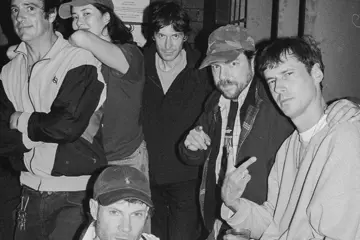The live music sector has today welcomed a much needed funding injection with a number of promoters and events included in the latest round of RISE Fund grants.
The program which was launched by the Federal Government last year in light of the COVID-19 pandemic and its decimation of the Australian music industry aims to support "the arts and entertainment sector to reactivate" and targets "funding towards the arts and entertainment sector organisations to assist in the presentation of cultural and creative projects, activities and events to rebuild confidence amongst investors, producers and consumers".
Today sees the announcement of its fourth round recipients, marking its biggest investment into live music events to date with nearly 40 locked in to receive funding in addition to other arts based events.
Big name music events included in this round of funding includes:
- Byron Bay Bluesfest 2021 - $2,400,000
Description: Bluesfest will be reignited with an all Australian line-up between 1st - 4th October 2021 – following consecutive COVID-19 cancellations in 2020 and 2021. - Chugg Music's The Squeeze Music Festival - $600,000
Description: A live music festival tour showcasing multiple Australian performers hosted throughout the country with a focus on reaching regional locations and audiences. - Handsome Tours Australia for A More Perfect Union - $406,195
Description: A More Perfect Union is a music festival curated by Sydney’s Gang Of Youths and produced by Handsome Tours. - Lost Paradise Festival - $496,473
Description: Recovering ‘Lost Paradise’: Re-Starting a sell-out Festival in Regional NSW - Lost Paradise will deliver a world-class, live-music festival to patrons in regional NSW, while providing critical income to performing artists and associated industries. - TEG LIVE Summer Series - $900,000
Description: TEG Live Summer Series sees two major music icons KISS and Keith Urban bringing their individual world class live concert tours to Australia. - Falls Music & Arts Festival 2021/22 - $1,475,000
Description: Now in its 28th year, Falls Music and Arts Festival is an outdoor music festival that generates millions in regional economic benefits in three states. - WOMADelaide 2022 - $1,200,000
Description: WOMADelaide’s 30th anniversary will celebrate cultural and creative diversity from some 600 Australian artists. The program will include significant artists from across the festival’s illustrious history. - Festival X - $1,037,690
Description: FestivalX one-day festival tour performing in Brisbane, Sydney, Melbourne, Adelaide and Perth. - Good Things Festival - $889,599
Description: The Good Things Festival in 2021, creating economic activity, jobs and performance opportunities for Australian artists and audiences. - The Archie Roach Foundation Stage at Port Fairy Folk Festival - $400,000
Description: In 2022, the Port Fairy Folk Festival will launch the Inaugural Archie Roach Foundation Stage, curated by Archie Roach and his local Gunditjmara community. - Live Nation Australasia - $1,092,760
Description: A national tour to celebrate the anniversary of an iconic band in 2022. - TEG Dainty - $750,000
Description: Iconic rock band, Guns N' Roses back on stage and touring across Australia. - Meredith & Golden Plains Festivals - $651,000
Description: Reactivating Meredith Music Festival and Golden Plains Festival in 2021/22 to celebrate the 30th and 15th year anniversary milestones, respectively. - Under The Southern Stars - $1,000,000
Description: A national, one day live music festival held in stunning locations throughout Australia.
Also included in the funding is Melbourne venue The Tote for their The Tote Rocks 40 series, Mushroom Group's Illusive Presents for their Immersive Cinema series, NYE On The Hill, Wave Rock Weekender, Origin Fields Festival and more. See the full list of round four funding here.
Launching in November last year, previous funding round recipients include Laneway Festival's Live From Your Local series, TEG/MJR Presents' Next Exit Festival, Cattleyard Promotions' Fresh Produce, Byron Bay Bluesfest, Secret Sounds, Big Pineapple Festival, Woodfork Folk Festival, The Queensland Music Trail, Dark Mofo and MONA FOMA, For The Love events, Meadow Festival, Queenscliff Music Festival, Ability Fest, Fairgrounds Festival, Boogie Festival, artists Peking Duk, BIGSOUND, The Tivoli, The Australian Festival Of Chamber Music, Beyond The Valley festival and more.
Don't miss a beat with our FREE daily newsletter
The Music has spoken with Minister for Communications, Urban Infrastructure, Cities and the Arts of Australia Paul Fletcher - who's portfolio includes the RISE Fund grants - about the support package this morning, as well as looking at the impact the COVID-19 pandemic has had on the music industry and the Federal Government's commitment to funding.
"What we’ve sought to do from a Commonwealth point of view is tailor our RISE funds to better support music," said Fletcher today.
"So, we’ve now cumulatively committed $200 million. We initially announced $75 million in the RISE fund last year, we topped it up with another $125 million during the budget. And following some recent consultations, we’ve tweaked the rules to try and make it work better for the music sector.
"And, indeed, just today, I’m announcing of that $200 million: a further $40 million [is] being allocated to 82 individual projects and events and festivals and productions around Australia. And of that, over 50% is music."
Paul Fletcher on the fourth round of the RISE Fund grants
"A particular push in festivals, so we’ve got $2.4 million for Bluesfest which, of course, tragically it was shut down literally hours before they were due to start earlier this year. And that really broke a lot of hearts. But, they’re determined to come back, and we’re committing $2.4 million to help them come back. The Falls Music And Arts Festival, we’re supporting the Meredith Folk Festival, the Good Things festival… we’re also supporting tours, Guns N’ Roses, KISS, Keith Urban…
"Now, people might say to me: ‘why would you put public money into tours of mega-global acts?’. Well, the answer is, again: it’s Australian promoters who are taking the risk. And tours like that generate a lot of jobs for people in the industry. You know, people in sound and lighting, roadies... but also ushers, front of house, ticket office, security, catering... And so, what we’re trying to do is allocate our funding to support both big-scale events, bearing in mind that hundreds of thousands of Australians cumulatively will go to shows like those; but also a whole range of smaller events.
"So, [that’s a] long-winded way of saying: we recognise music has some specific challenges. From a Commonwealth point of view, what we’ve tried to do is adjust the way that our funding works to support the music sector.
"And then on the question of an insurance scheme; one of the ways that the RISE funds works is: it’s essentially putting money in the hands of promoters, festival organisers and so on, that they don’t have to find from another source, or from their own resources," Fletcher explained.
"And they know that the money’s there, and if, unfortunately, the event doesn’t go ahead, if it’s cancelled on COVID grounds…that’s not money they have to repay. So, you can think of it almost as a form of pre-insurance, it’s helping de-risk shows and helping promoters make the decision: ‘OK, we’ll go ahead with this, because some of our risk is already covered with this component of public money from the Commonwealth’s RISE fund'."
Fletcher on whether the Federal Government is reticent to reinstate JobKeeper for some industries
While the funding has been welcomed by the live sector, there's still a long way to go before the industry gets even close to have stability around touring and jobs. With the constant threat of outbreaks and subsequent restrictions and lockdowns, there are calls for JobKeeper to be reinstated for the industries still affected.
Shadow Minister for the Arts Tony Burke has also spoken with The Music to address this issue.
"The big thing now, I think - you need to look at it in terms of: what do we need to have [for] the workers to see them through, the artists and the workers, to see them through during this time? And secondly: what do we need to allow the promoters to be willing to take on risk? If you get those two things right: then we’ve got a pathway through," said Burke yesterday.
"For the artists and the workers and everybody, through to road crew and people working in bars at venues: effectively we need to have a form of JobKeeper that everybody will be eligible for. Now, the Government, at the moment, they’re still saying no to it. But when we first called for a wage subsidy last year they were saying no to it, they were describing it as dangerous. So, they might be saying no - I’m not giving up!"
Applications for the RISE Fund remain open until 31 December 2021, with $100 million in funding still available. Head here for more information and to apply.

















